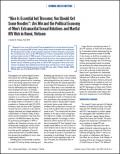Publications - Released in 2008
Research from around the world has suggested that married women’s greatest risk for contracting HIV is from having sexual intercourse with their husbands. On the basis of 6 months of ethnographic research in Hanoi, Vietnam, this paper argues that the contemporary nature of the HIV epidemic in Hanoi is shaped by 3 interrelated policies implemented in 1986 as part of the government’s new economic policy, Doi Moi (Renovation). Together, these policies structure men’s opportunities for extramarital sexual relations and encourage wives to acquiesce to their husbands’ sexual infidelity, putting both at risk of HIV. The study proposes 4 structural intervention strategies that address the policies that contribute to men’s opportunities for extramarital liaisons and to marital HIV risk.






